Tag: scholarly communication
Academic Council Affirms Commitment to Open Access Efforts like OA2020
By letter to University of California President Janet Napolitano, the Academic Council has enthusiastically endorsed and affirmed university-wide commitments to make UC research and scholarship as freely and openly available as possible.
The letter of the Academic Council, which advises the UC President on behalf of the Assembly, updates President Napolitano on various campus efforts to fulfill the University’s mission of providing long-term societal benefits through transmitting advanced knowledge. As the Council notes, one way that the University has been working to achieve its mission is through implementation of the 2013 Open Access policy, pursuant to which UC scholars widely disseminate their scholarship by making copies available open access (OA). OA promotes free, immediate access to research articles and the rights to use these articles to advance knowledge worldwide.
“As the nation’s largest public research institution and a source of two percent of the world’s research literature,” explains Jim Chalfant, Academic Council Chair, “the University of California is uniquely positioned to further this goal for the benefit of people all over the world who currently do not have access to the vast majority of scholarly research articles.”
Indeed, since the adoption of the 2013 OA policy, the ten UC campuses have made important progress toward increasing both the dissemination and impact of UC scholarship while reducing barriers to readership.
One way in which the Berkeley campus has contributed to a more open scholarly landscape is by engaging in open access initiatives such as OA2020, noted in particular in the Council’s letter. OA2020 is an international movement, led by the Max Planck Digital Library in Munich, to convert the entire corpus of scholarly journal literature to open access by the year 2020. The OA2020 movement intends to accomplish this “flipping” by encouraging institutions to convert resources currently spent on journal subscriptions into funds that support sustainable OA business models. Berkeley signed the OA2020 Expression of Interest in March 2017 along with UC Davis and UCSF.
In affirming UC Berkeley, UC Davis, and UCSF’s participation in OA2020 and similar initiatives, the Academic Council avows OA2020’s alignment with both the 2013 OA policy and the UC’s mission to conduct research in the public interest and serve society. Accordingly, both the Council and the Academic Senate’s Committee on Library and Scholarly Communication “support all efforts by UC campuses to promote open access to scholarly research, both in the service of the University’s Open Access mission and in the service of similarly-oriented global missions such as OA2020.”
To learn more about why UC Berkeley, UC Davis, and UCSF signed the OA2020 Expression of interest, please see our joint statement, Why OA2020? (attached as Appendix C to the Academic Council’s letter), or our website, OA2020.us.
To discover more about the many initiatives in which the UC Berkeley Library engages to advance progress toward sustainable open access publishing, please see our Scholarly Communication Services page about our Open Access Initiatives.
We warmly welcome opportunities to talk more about these efforts, so please feel free to reach out to us: schol-comm@berkeley.edu.
Freedom to Marry Oral History Project
The Freedom to Marry Oral History Project
In the historically swift span of roughly twenty years, support for the freedom to marry for same-sex couples went from an idea a small portion of Americans agreed with to a cause supported by virtually all segments of the population. In 1996, when Gallup conducted its first poll on the question, a seemingly insurmountable 68% of Americans opposed the extension of marriage rights. In a historic reversal, fewer than twenty years later several polls found that over 60% of Americans had come to support the freedom to marry nationwide. The rapid increase in support mirrored the progress in securing the right to marry coast to coast. Before 2004, no state issued marriage licenses to same-sex couples. By spring 2015, thirty-seven states affirmed the freedom to marry for same-sex couples, with a number of states extending marriage through votes in state legislatures or at the ballot box. The discriminatory federal Defense of Marriage Act, passed in 1996, denied legally married same-sex couples the federal protections and responsibilities afforded married different-sex couples—a double-standard corrected when a core portion of the act was overturned by the U.S. Supreme Court in 2013 in United States v. Windsor. The full national resolution came in June 2015 when, in Obergefell v. Hodges, the U.S. Supreme Court ruled that the Constitution’s guarantee of the fundamental right to marry applies equally to same-sex couples.
The Oral History Center is thrilled to release to the public the first major oral history project documenting the vast shift in public opinion about marriage, the consequential reconsideration of our nation’s laws governing marriage, and the actions of individuals and organizations largely responsible for these changes. The Freedom to Marry Oral History Project produced 23 interviews totaling nearly 100 hours of recordings. Interviewees include: Evan Wolfson, founder of Freedom to Marry; Kate Kendell, executive director of the National Center for Lesbian Rights; James Esseks, director of the ACLU’s LGBT & HIV project; and Thalia Zepatos, the movement’s “message guru” who worked at Freedom to Marry as director of research and messaging. Read on for video clips of the interviews and links to complete interview transcripts.
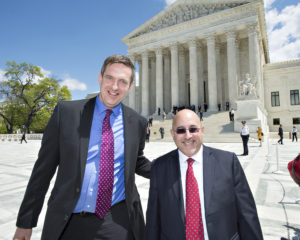
At the center of the effort to change hearts and minds, prevail in the courts and legislatures, win at the ballot, and win at the Supreme Court was Freedom to Marry, the national campaign launched by Harvard-trained attorney Evan Wolfson in 2003. Freedom to Marry’s national strategy focused from the beginning on setting the stage for a nationwide victory at the Supreme Court. Working with national and state organizations and allied individuals and organizations, Freedom to Marry succeeded in building a critical mass of states where same-sex couples could marry and a critical mass of public support in favor of the freedom to marry. This oral history project focuses on the pivotal role played by Freedom to Marry and their closest state and national organizational partners, as they drove the winning strategy and inspired, grew, and leveraged the work of a multitudinous movement.
Freedom to Marry Oral History Project Interview Transcripts:
Barbara Cox, “Barbara Cox on Marriage Law and the Governance of Freedom to Marry.”
Michael Crawford, “Michael Crawford on the Digital Campaign at Freedom to Marry.”
Scott Davenport, “Scott Davenport on Administration and Operations at Freedom to Marry.”
Jo Deutsch, “Jo Deutsch and the Federal Campaign.”
Sean Eldridge, “Sean Eldridge on Politics, Communications, and the Freedom to Marry.”
James Esseks, “James Esseks on the Legal Strategy, the ACLU, and LGBT Legal Organizations.”
Harry Knox, “Harry Knox on the Early Years of Freedom to Marry.”
Matt McTighe, “Matt McTighe on the Marriage Campaigns in Massachusetts and Maine.”
Amy Mello, “Amy Mello and Field Organizing in Freedom to Marry.” (forthcoming)
John Newsome, “John Newsome on And Marriage for All.”
Kevin Nix, “Kevin Nix on Media and Public Relations in the Freedom to Marry Movement.”
Bill Smith, “Bill Smith on Political Operations in the Fight to Win the Freedom to Marry.”
Marc Solomon, “Marc Solomon on Politics and Political Organizing in the Freedom to Marry Movement.” (forthcoming)
Tim Sweeney, “Tim Sweeney on Foundations and the Freedom to Marry Movement.”
Cameron Tolle, “Cameron Tolle on the Digital Campaign at Freedom to Marry.”
Thomas Wheatley, “Thomas Wheatley on Field Organizing with Freedom to Marry.”
Evan Wolfson, “Evan Wolfson on the Leadership of the Freedom to Marry Movement.”
Thalia Zepatos, “Thalia Zepatos on Research and Messaging in Freedom to Marry.”

Professor Susan Ervin-Tripp: 2016 Class of ’31 Interviewee in University History
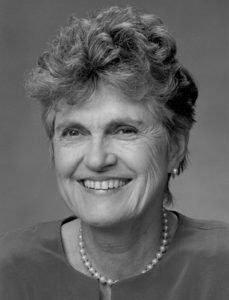
One of the great joys of being an oral historian is getting to talk to people you otherwise wouldn’t have known. We have the privilege of asking people about their lives, putting their experiences in context of the larger historical landscape, posing questions that others don’t have the opportunity to ask. I had the opportunity to do just this when I interviewed Professor Susan Ervin-Tripp in 2016.
Professor Dan Slobin puts it best in the introduction he wrote for Ervin-Tripp’s oral history:
Throughout her long and productive career, Susan Ervin-Tripp has repeatedly been a path-breaker. And the paths that she helped explore have become well-traveled roads. I is remarkable to see so many innovations in one life story: psycholinguistics and sociolinguistics, embracing new directions in the study of first-language acquisition as well as bilingualism; repeated applications of new technology: computers, tape recorders, video recorders, wireless microphones; design of new methods of transcribing and documenting the many layers of speech interaction; cross-linguistic and cross-cultural research, with attention to both individual and interpersonal dimensions of language. Along with these contributions to the scientific side of her profession, Ervin-Tripp has given equal attention to the institutional and political dimensions of academia, focusing on the treatment of women and minorities. Wherever possible, she used her academic skills as a psycho- and sociolinguist to provide a scientific foundation to her advocacy.
Slobin is not the only one who values Ervin-Tripp’s many contributions. Her interview was part of our Class of ’31 series, in which faculty and staff, both current and retired, are nominated by admirers to the subject an oral history. Ervin-Tripp received numerous, passionate nominations which conveyed a resounding eagerness to document her work in academics and equity, knowing that we could all benefit from learning about her trailblazing work.
I sat down with Ervin-Tripp for our first interview in May of 2016. It was immediately clear that she was a practiced speaker, having taught for many years, with a healthy sense of humor. She was poised and articulate, prepared with her notes. Over the course of our six hours of interviews, we discussed her childhood during the Great Depression in Minneapolis, Minnesota, her undergraduate education at Vassar College, her doctoral work at the University of Michigan, and her career at UC Berkeley, which began in 1958. She detailed her work on the Southwest Project in Comparative Psycholinguistics studying the connection between language and cognitive performance, her time as a professor in the Psychology and Speech Departments at Berkeley, her early adoption of technology in her research, her participation at Stanford University’s Center for Advanced Studies in the Behavioral Sciences and with the 1985 Scientific Exchange program in France. She talked about the significant advances that she made for women’s equality on campus and the multiple efforts she made to create such change.
It was a pleasure to have interviewed a woman whose career has impacted Berkeley so greatly. There are many lessons to learn from this interview, particularly the courage and persistence it takes to create an equitable environment. Professor Susan Ervin-Tripp’s oral history is one that is rare for her generation and one that should be celebrated.
Shanna Farrell, Interviewer, Oral History Center
Library Statement on Commitment to Free and Open Information, Scholarship, and Knowledge Exchange
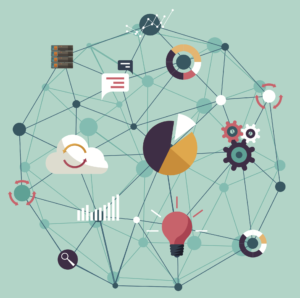
Global Knowledge Exchange
This post originally appeared on the University of California Office of Scholarly Communication‘s blog, March 6, 2017.
The University of California Office of Scholarly Communication (OSC) and the University of California Libraries issue the following statement in response to recent actions by the new federal administration and in order to address resulting concerns about continued open access to and preservation of information, scholarship, and knowledge.
The unfettered exchange and careful preservation of information are fundamental to democracy, progress, and intellectual freedom. The critical research and scholarship conducted by government entities and academic institutions worldwide safeguard and support human rights, public health, the environment, artistic and literary enterprise, scientific and technological innovation, and much more. This scholarship is critical for informed discourse and policy development throughout society. As such, the fruits of governmental and scholarly research—the data and documentation generated and released—must remain publicly available and must not be suppressed, endangered, or altered to serve political ends.
To encourage broad dissemination of research and scholarship, the faculty of the University of California and the UC President have implemented open access policies that echo many of the open data and scholarship mandates adopted by the federal government. Recognizing that open access to research increases scientific, scholarly, and critical knowledge, the UC system has committed, via these policies, to making all UC scholarly articles widely and freely accessible, regardless of access restrictions elsewhere. Now more than ever, UC faculty and staff’s participation in these open access policies is fundamental to ensuring persistent, unfettered access to valuable data and research.
OSC and the UC Libraries are working to protect public access to government data and research in the event that the original sources for these materials should be compromised. In the coming weeks, OSC and librarians on each of the UC campuses will identify specific actions to be taken to ensure that research data, publications, and scholarship remain accessible and discoverable. These efforts are not intended to supplant the authoritative sources for government data, publications, and information. Rather, we are working to make certain that these materials remain shielded from inappropriate political influence or suppression.
We support similar information rescue and preservation efforts taking place around the country and encourage other institutions to join in this commitment. We look forward to seeing statements from our peer institutions (and encourage any who wish to borrow or adapt ours), and we welcome opportunities to work with these institutions on projects supporting access to and preservation of the scholarly record. In particular, we offer our collaboration to those working in disciplines or within organizations facing new threats.
In the meantime, we wish to underscore our commitment to advocating not only for researchers and authors at UC campuses, but also for scholars and readers worldwide, and to emphasize our dedication to ensuring information access as an essential public good. We will continue to champion these professional and democratic values and to challenge any policies or practices that levy obstacles to intellectual exchange.
Great talks and tips in Love Your Data Week 2017
Opening out #LYD17 w/great discussion of #securing research data. Thanks to our experts speakers @UCBIDS @DH @DLabAtBerkeley @ucberkeleylib pic.twitter.com/DqvIKb9sDL
— Yasmina Anwar (@yasmina_anwar) February 14, 2017
This week, the University Library and the Research Data Management program were delighted to participate in the Love Your Data (LYD) Week campaign by hosting a series of workshops designed to help researchers, data specialists, and librarians to better address and plan for research data needs. The workshops covered issues related to managing, securing, publishing, and licensing data. Participants from many campus groups (e.g., LBNL, CSS-IT) were eager to continue the stimulating conversation around data management. Check out the full program and information about the presented topics.
Photographs by Yasmin AlNoamany for the University Library.
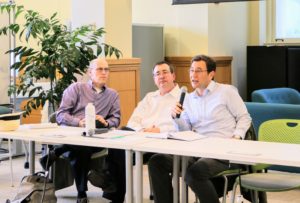
The first day of LYD week at UC Berkeley was kicked off by a discussion panel about Securing Research Data, featuring
Jon Stiles (D-Lab, Federal Statistical RDC), Jesse Rothstein (Public Policy and Economics, IRLE), Carl Mason (Demography). The discussion centered upon the rewards and challenges of supporting groundbreaking research when the underlying research data is sensitive or restricted. In a lively debate, various social science researchers detailed their experiences working with sensitive research data and highlighted what has worked and what has proved difficult.
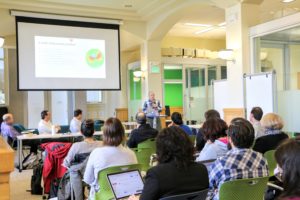
At the end, Chris Hoffman, the Program Director of the Research Data Management program, described a campus-wide project about Securing Research Data. Hoffman said the goals of the project are to improve guidance for researchers, benchmark other institutions’ services, and assess the demand and make recommendations to campus. Hoffman asked the attendees for their input about the services that the campus provides.
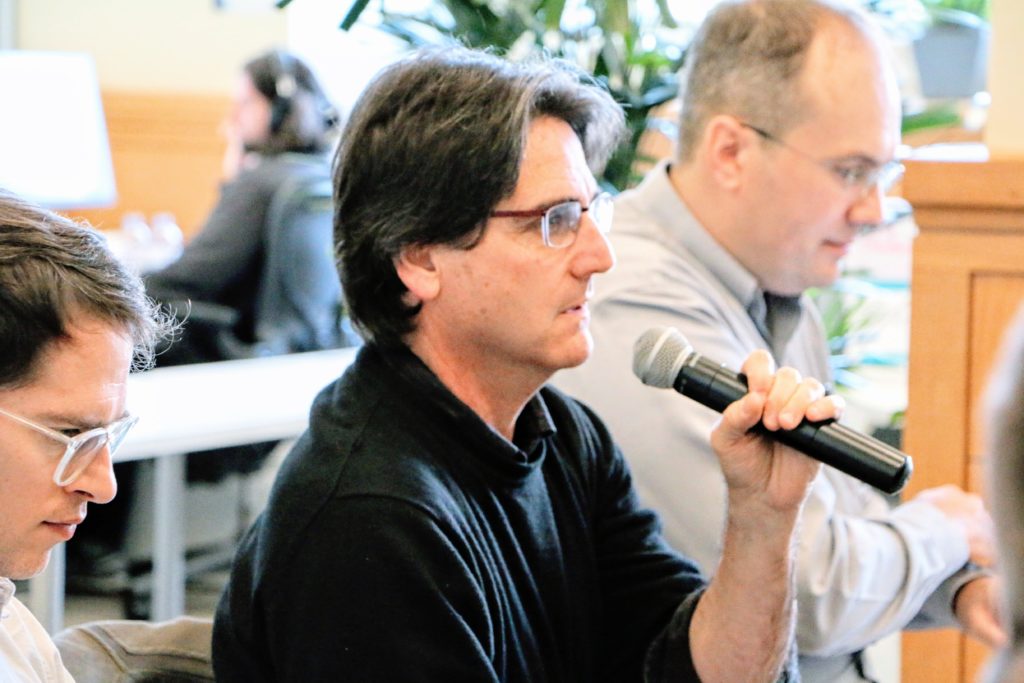
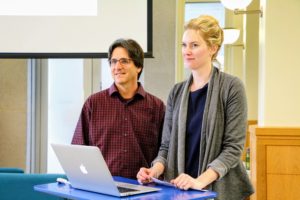
On the second day, we hosted a workshop about the best practices for using Box and bDrive to manage documents, files and other digital assets by Rick Jaffe (Research IT) and Anna Sackmann (UC Berkeley Library). The workshop covered multiple issues about using Box and bDrive such as the key characteristics, and personal and collaborative use features and tools (including control permissions, special purpose accounts, pushing and retrieving files, and more). The workshop also covered the difference between the commercial and campus (enterprise) versions of Box and Drive. Check out the RDM Tools and Tips: Box and Drive presentation.
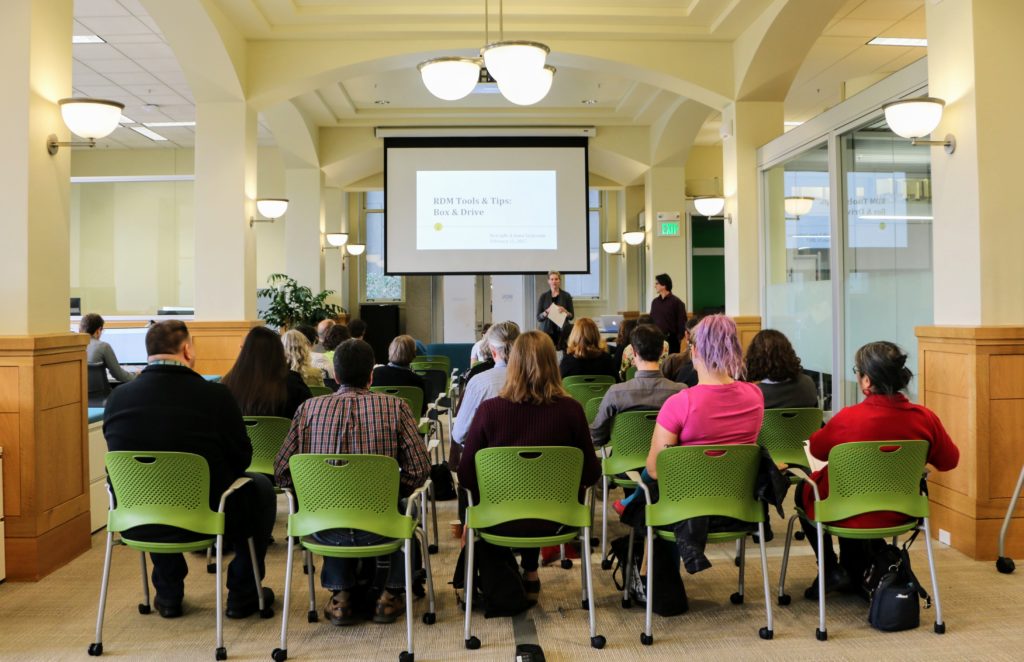
We closed out LYD Week 2017 at UC Berkeley with a workshop about Research Data Publishing and Licensing 101. In the workshop, Anna Sackmann and Rachael Samberg (UC Berkeley’s Scholarly Communication Officer) shared practical tips about why, where, and how to publish and license your research data. (You can also read Samberg & Sackmann’s related blog post about research data publishing and licensing.)
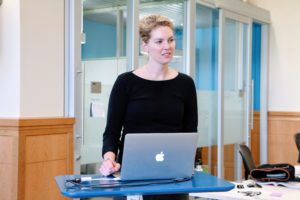
In the first part of the workshop, Anna Sackmann talked about reasons to publish and share research data on both practical and theoretical levels. She discussed relevant data repositories that UC Berkeley and other entities offer, and provided criteria for selecting a repository. Check out Anna Sackmann’s presentation about Data Publishing.
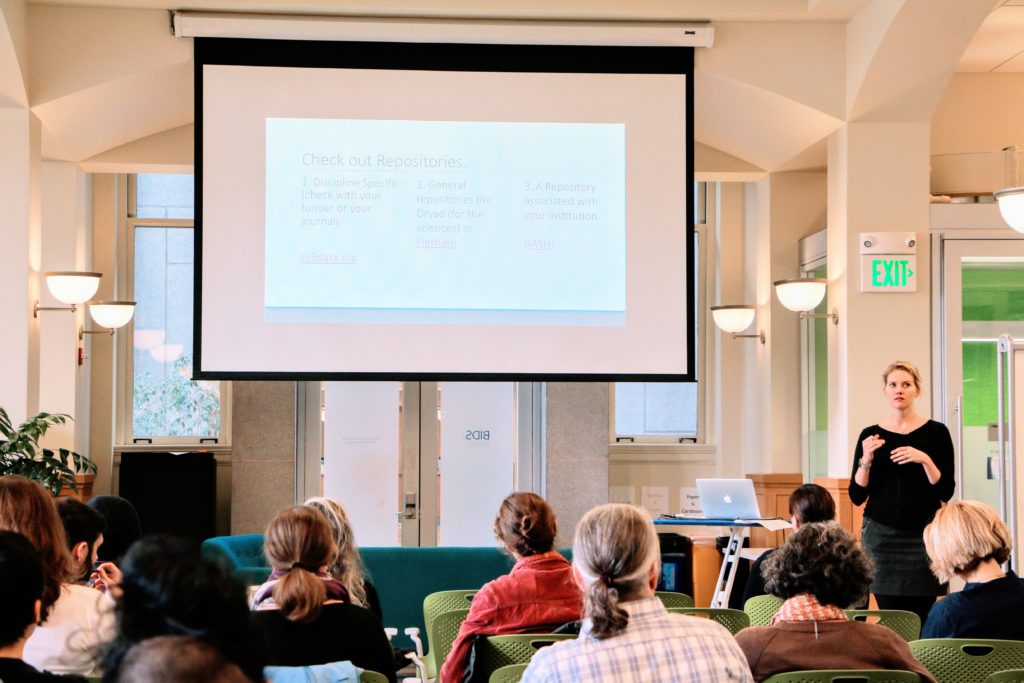
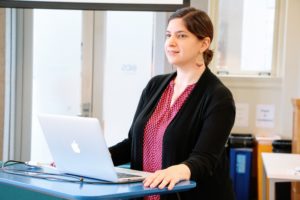
During the second part of the presentation, Rachael Samberg illustrated the importance of licensing data for reuse and how the agreements researchers enter into and copyright affects licensing rights and choices. She also distinguished between data attribution and licensing. Samberg mentioned that data licensing helps resolve ambiguity about permissions to use data sets and incentivizes others to reuse and cite data. At the end, Samberg explained how people can license their data and advised UC Berkeley workshop participants to contact her with any questions about data licensing.
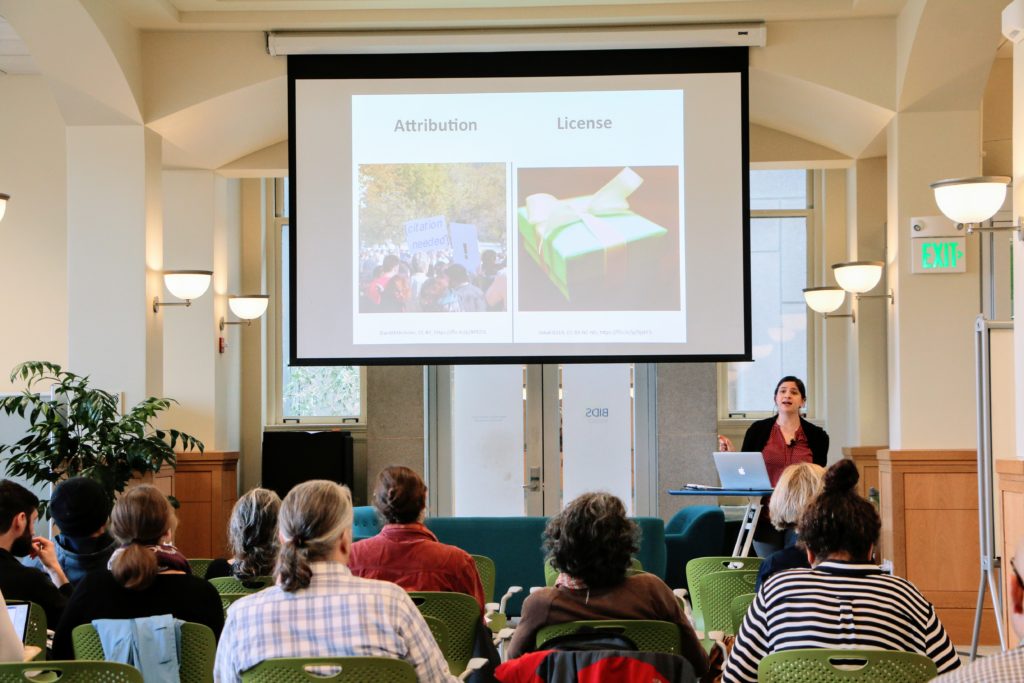
Check out the slides from Rachael Samberg’s presentation about data licensing below.
The workshops received positive feedback from the attendees. Attendees also expressed their interest in having similar workshops to understand the broader perspectives and skills needed to help researchers manage their data.
—
Yasmin AlNoamany
Special thanks to Rachael Samberg for editing this post.
UC Berkeley Open Access Authors: We’re Celebrating You!
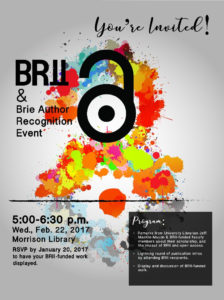
Join faculty, students, and colleagues for wine and cheese as the UC Berkeley community recognizes and discusses UCB open access papers at the BRII & Brie Author Recognition Event (open to all) being held in Morrison Library on Feb. 22, 2017 from 5:00-6:30 p.m.
We’re Celebrating Because You’ve Published For Impact
You’re over the moon because your new paper has just been accepted to a high-impact journal that is published open access—free, digital, and available to anyone online. You chose this journal because open access (OA) publishing can promote increased readership by lowering access barriers, and can spur innovation through fewer restrictions on use.
But suddenly you’re faced with a quandary: There’s a steep fee to make all this happen—an “article processing charge” (APC), typically somewhere between $650-$3,500, that authors are asked to provide to publishers for OA publication in lieu of typical print-subscription fees paid for by libraries. You want people to read and cite your scholarship, and you hope to advance knowledge by enabling maximal use of your scholarly output. But how can you finance and participate in this new scholarly publishing landscape?
One option is to deposit a copy of the article you submitted into a repository, in keeping with the UC system’s OA policy. (For more on the OA policy, see the UCOP Office of Scholarly Communication’s helpful guide.) To that end, UC scholars and staff can deposit pre-print copies of their publications in eScholarship (the repository created by California Digital Library), or can choose a discipline-specific repository like arXiv or the new Humanities Commons.
Depositing preprints and making them available at no cost to the public in this fashion can have remarkable impacts for building knowledge and augmenting your academic reputation. Yet, there is still one other parameter of an APC-based OA publishing system that remains to be addressed: covering the APC, itself. What can you do when an esteemed open access journal like BMC Biology asks you to provide $2,785 to publish your accepted paper in their online journal? Maybe you have grant funds to cover this APC, but maybe you don’t, and maybe you don’t have a grant at all.
What’s The Solution?
UC Berkeley’s Library can help, and we’re about to start celebrating that. The Berkeley Research Impact Initiative (BRII) makes APC funding available to UC Berkeley authors (current faculty members, post-docs, students, researchers) and publishers (campus Centers, Organized Research Units, and Departments) to make your publications free to all readers immediately upon publication—thereby also helping to increase the impact of your scholarship.
Started in 2008, BRII has provided around $400,000 of funding for several hundred articles and publications across numerous discipline areas. In a 2016 paper, authors Teplitzky and Phillips reported that 89% of responding BRII recipients agreed that the availability of BRII to help pay the APC or open access fee for their article affected their decision about where to publish, and 44% had not published an open access article prior to the one funded by BRII. Most respondents (82%) believed their article had a greater impact overall because it was OA.
Let’s Celebrate UC Berkeley Scholarship!
So, it’s high time to recognize the scholarship of BRII-funded authors, and raise awareness about available BRII funding. That’s exactly what the Library will be doing with the BRII & Brie Author Recognition Event (open to all) being held in Morrison Library on Feb. 22, 2017 from 5:00-6:30 p.m.
You can hear remarks from University Librarian Jeff MacKie-Mason and BRII-funded faculty members about their scholarship, and the impact of BRII and open access. There will also be a lightning round of paper discussions by attending BRII recipients, so you can learn more about the OA scholarship being created here at UC Berkeley. BRII-funded works will also be displayed, so if you already are a BRII recipient, please RSVP by January 20 to have your work shown at the event.
We hope you’ll join us to celebrate your colleagues in an evening of learning and author recognition. If you know little about OA or BRII, but aspire to publish, please join us to find out more about this important funding program. RSVP here!
ACS and RSC to require ORCIDs
The Royal Society of Chemistry (RSC) and the Publications Division of the American Chemical Society (ACS) recently signed the ORCID Open Letter. For published articles the two societies will now require ORCIDs (Open Researcher and Contributor IDs) for corresponding authors and will automatically collect and display the ORCIDs of all submitting authors. The RSC announcement states that coordination between the publishers, Crossref and ORCID will ensure that published works are properly attributed.
In adopting the ORCID system RSC and ACS join a number of other publishers and journals including eLife, the European Molecular Biology Organization (EMBO), the American Geophysical Union (AGU), Institute of Electrical and Electronics Engineers (IEEE), Science journals, Wiley, and Wellcome Open Research.
Digital Humanities for Tomorrow
Opening the Conversation About DH Project Preservation
By Rachael G. Samberg & Stacy Reardon
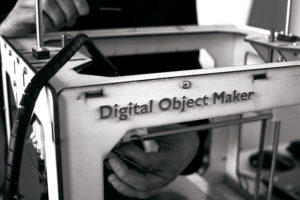
Digital Object Maker. Sayf, CC BY-NC-ND 2.0
After intensive research, hard work, and maybe even fundraising, you launch your digital humanities (DH) project into the world. Researchers anywhere have instant access to your web app, digital archive, data set, or project website. But what will happen to your scholarly output in five years? In twenty-five? What happens if you change institutions, or institutional priorities shift? Will your digital project be updated or forced to close up shop? Who should ensure that your project remains available to researchers? Which departments should guide long-term sustainability of your research? Continue reading “Digital Humanities for Tomorrow”
My Dissertation Is Online! Wait – My Dissertation Is Online?! Copyright & Your Magnum Opus
This post was originally published on the University of California Scholarly Communication Blog.

You’ve worked painstakingly for years (we won’t let on how many) on your magnum opus: your dissertation—the scholarly key to completing your graduate degree, securing a possible first book deal, and making inroads toward faculty status somewhere. Then, as you are about to submit your pièce de résistance through ProQuest’s online administration system, you are confronted with the realization that—for students at many institutions—your dissertation is about to be made available open access online to readers all over the world (hurrah! and gulp).
Because your dissertation will be openly available online, there are many questions you need to address—both about what you put in your dissertation, and the choices you’ll need to make as you put it online. If you are a first-time author, facing these concerns can be daunting to say the least. And you definitely don’t want to be thinking about them for the first time when you are scrambling to submit your dissertation to ProQuest.
For instance, you’ll need to consider:
- Are you using materials created by other people in your dissertation? Perhaps you’re using photos, text excerpts, scientific drawings or diagrams? You might need the authors’ permission to include them.
- Are you using materials from a library’s special collections or archives? You may have signed agreements or accepted terms of use that affect what you can publish from those materials. (Examples: Archive.org, Harvard’s Houghton Library, Smithsonian, and Niels Bohr Library & Archives.)
- Are you including information about particular living individuals? You might need to consider their privacy rights (see, for instance, a discussion on p. 15 of a University of Michigan dissertation guide).
- If you own copyright in your dissertation (as most grad students in the UC campus system do), should you register your copyright?
- Do you need to embargo your dissertation for privacy, patent, or other concerns?
- Should you license your dissertation for greater use by others?
At UC Berkeley, we’ve created a workflow and guide for you to tackle these kinds of important copyright and other legal questions. Below, I’ve included highlights from the workflow, but there are plenty more best practices to draw upon in the guide. What follows are, of course, exactly that: best practices, and not legal advice. Your local scholarly communication officer or librarian (see this list for some resources around UC) can help you find additional information as you consider these issues for your own dissertation.
Copyright Basics First
Before using the workflow, it can be helpful first to understand what copyright is—and is not. In short, copyright means that authors get exclusive publishing, reproduction, and other rights over their original works of expression for limited periods of time.
What this means for your dissertation is: If you’re including someone else’s work that’s “in copyright,” meaning protectable by copyright law and still within that limited time period (usually at least an author’s life + 70 years in the U.S), then you need to think about whether you need the author’s permission to include that work. You don’t need permission if your use would be “fair” under the law. Don’t worry, our guide helps address what’s considered fair use, as well as what’s eligible for copyright protection to begin with.
Okay, on to the workflow. Remember, you’ll need to ask these questions for every work you include that was created by someone else. And, keep in mind that addressing these questions takes time.
The Workflow
Step 1: Do you need permission first to include someone else’s work online?
You don’t need the copyright holder’s permission to include an excerpt / photo / diagram / whatever-you’re-using if any one of the following is true:
- The copyright holder has already granted a license for you to include their work. Sometimes, authors have already provided permission through grants such as Creative Commons licenses. For instance, this is a photo of people talking over ice cream that I took and that you can use for any purposes as long as you attribute me as the author (i.e. I’ve applied a Creative Commons Attribution, or CC-BY license, to it).
- The work is in the public domain. Public domain works are open for use with no permission needed. Just because a work is online does not mean it’s in the public domain. Rather, public domain refers to works for which copyright protections have expired, or works that were ineligible for protection in the first place (facts, ideas, federal government materials, etc.).
- Publishing the content would be fair use. Fair use—which is meant to encourage teaching, research, scholarship, criticism, and parody—allows you to exercise the otherwise-exclusive rights of the copyright holder (distribution, creating adaptations, etc.) without having to seek the copyright holder’s permission. For a use to be fair, though, you have to consider four factors that collectively weigh in favor of “fair use.” Records of your fair use analysis—which you can create by filling out a checklist—can be very helpful to have on hand if there are ever questions about your reasoning or use.
Remember: Attribution is not the same as permission! Even if you cite your sources (which, of course, you will!), this doesn’t mean you have permission to include the excerpts from them in the first place. And, if you’re linking to an authorized (e.g. not illegally-posted) source, it’s always fine (at least in the U.S.!) to link to the content online rather than including the item itself.
Step 2: If the copyright holder’s permission is needed, how do you get it?
If you couldn’t answer “yes” to anything in Step 1, you’ll need to seek the copyright holder’s permission to include the work or excerpt in your dissertation. Obtaining permission can take a long time, so plan in advance. You’ll need to research and locate the copyright holder and then ask, in writing, for permission covering all your intended uses. Here are some useful sample permission request letters:
- University of Texas Libraries: Template letter for requesting permission
- George Washington University Library: Sample permission letter
- UCLA Library: Sample permission letter
Remember: A copyright holder’s silence is not permission. If you do not hear back in response to your request, you are now faced with a question of risk assessment, and whether to keep seeking permission or embrace the likelihood (or not) of the rights holder challenging your use down the road. In some of these situations, you may ultimately decide to limit your use further, or use a different work entirely—but you’ll need to make a decision one way or the other.
Step 3: What about other non-copyright legal or policy concerns?
Human subject research methodology, issues of indigenous knowledge, and other ethical concerns are best discussed with your dissertation advisors and institutional review boards. But the workflow does address a few other legal questions that at first might seem like copyright questions, yet actually pertain to different legal doctrines.
For instance, while copyright protects copyright holders’ property rights in their works, privacy law protects the interests of people who are the subjects of those works. Privacy rights in scholarship most often arise if you are seeking to use third party content like correspondence, diaries, and images that contain personal information about or pictures of particular people. But, they expire at death—meaning, you can’t be liable for disclosing private facts about a person no longer living. There are typically two additional important defenses to claims for invasion of privacy: newsworthiness and permission. If the material you wish to include reveals private facts that are of public interest or concern (which your dissertation scholarship may be) or if the person who is the subject of the information has given you permission to include it (which you may have obtained), then an invasion of privacy claim should not be sustainable.
Another non-copyright legal issue that often comes up in the context of dissertations is contract law (see p. 185 of Peter Hirtle’s excellent book on digitization). If you are using materials from archives, museums, library special collections, you may need to consider website terms of use agreements or contracts you signed (or clicked through online) with the archival institution. This is because, irrespective of whether the materials are protected by copyright, you may have entered into an agreement dictating whether or not you can include material from the works. Read carefully any agreement or website terms of use that you are asked to agree to. Inquire with the library or archives directly about whether a waiver is possible if you need one, or seek additional information from them about securing the right to publish.
Step 4: Address publication issues.
If you are a UC graduate student, your dissertation will be made available through ProQuest and/or published open access online in eScholarship. There are some issues to consider before clicking “submit”:
- Should you register your copyright with the U.S. Copyright Office? As a UC student, in most cases, you automatically own the copyright in your dissertation. However, registering copyright in your dissertation offers certain distinct advantages: It provides public record that you are indeed the author and owner, and also enables greater enforcement of your rights against infringers or plagiarists.
- Should you embargo your dissertation? Making your work available to be read online immediately has many advantages. Not only does it establish when your work was created and published (which can help combat plagiarism), but also it can help build your academic reputation. There are circumstances, however, that would warrant an embargo—such as situations where there would be disclosure of patentable rights or there are ethical concerns, or a book/journal publisher has demanded it (which is rare). You should consult guidance from your institution about when embargos are recommended or approved. For instance, here are UC Berkeley’s guidelines on embargoes.
- Do you want to license your work beyond fair use? As with any other copyrighted work, other scholars can make fair use of your dissertation in their own research. You can also decide to license your work beyond what fair use allows by applying a Creative Commons license to it. This should be a careful decision, which you discuss fully with your dissertation advisors and journal or monograph publishers in your field. There may be discipline-specific reasons to decide to—or not to—license your work, so examine them closely.
Once you get into the groove of answering these workflow questions, you’ll become a pro at addressing copyright and other policy issues in all of your subsequent scholarship, too. Perhaps the two most important points to keep in mind are:
- Start early, since this workflow can take some time, and
- Contact the librarian or scholarly communication officer on your campus who can help walk you through all this. For UC Berkeley researchers, I’m here for you!
Good luck, and keep writing!
P.S. Want more beyond our guide? There are several other excellent online resources about electronic dissertations to check out:
- Kenneth D. Crews, Copyright and Your Dissertation or Thesis: Ownership, Fair Use, and Your Rights and Responsibilities
- University of Michigan’s Copyright for Dissertations: Getting Started
- University of Michigan’s A Graduate Student’s Guide to Copyright: Open Access, Fair Use, and Permissions
- Hillary Corbett, ETDs and the Consequences of Openness
- Ohio State’s Copyright in Your Thesis or Dissertation
Publish in RSC journals for free

The UC Berkeley Library is partnering with the Royal Society of Chemistry to support free Open Access publishing under the RSC’s Gold for Gold initiative.
But you must act soon: the Gold for Gold program will only continue until March 2017.
The program offers voucher codes that enable Berkeley researchers to publish their papers in Royal Society of Chemistry journals free of charge, as Gold Open Access (OA) articles, without paying the normal article publication fee (between £1000 and £2500).
You are eligible if:
- You are a UC Berkeley affiliate (faculty, staff, or student)
- Your article is new and has been accepted for publication by RSC (i.e., vouchers cannot be used for articles that have already been published) and
- You have not previously received a Gold for Gold voucher from the UC Berkeley Library in 2016
The application form is available at http://goo.gl/GAUwr, and as noted above, vouchers must be used by March 2017.
Questions? Please contact Elliott Smith, Interim Chemistry Librarian, at esmith [at] library.berkeley.edu
